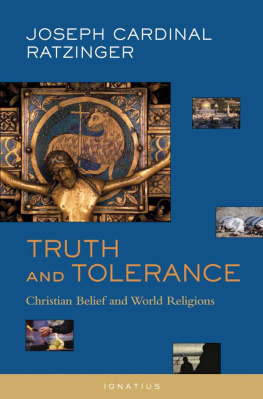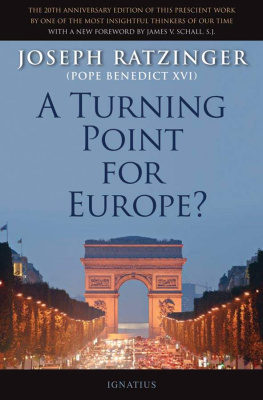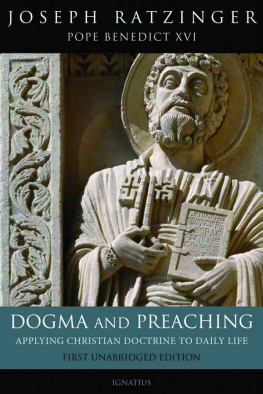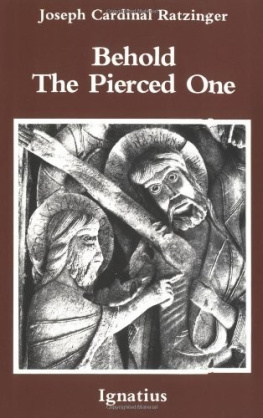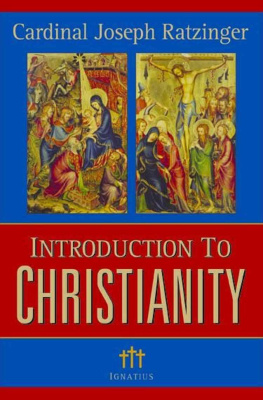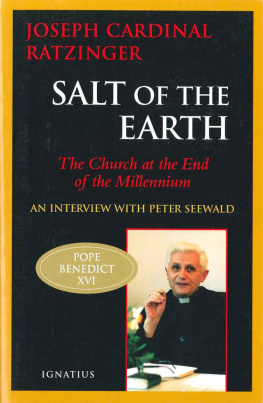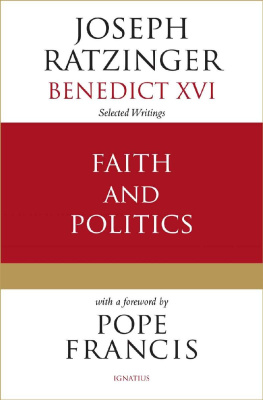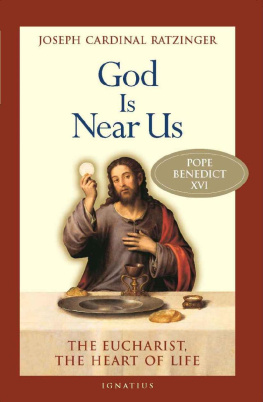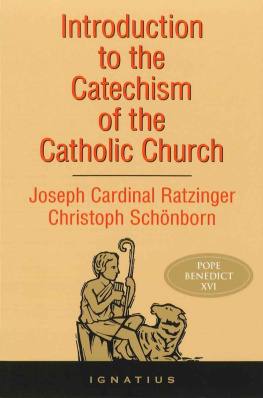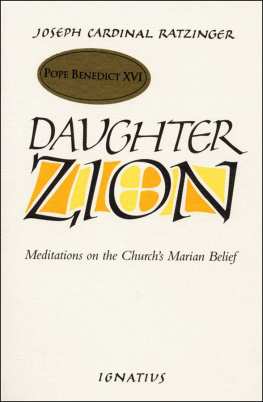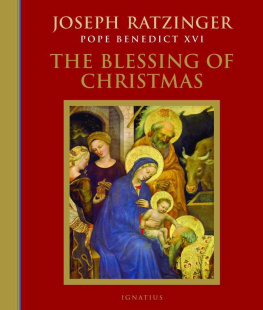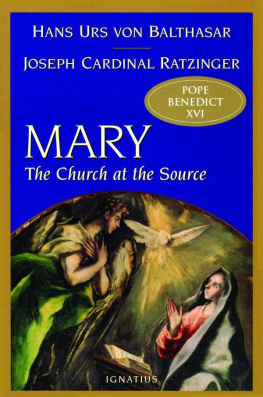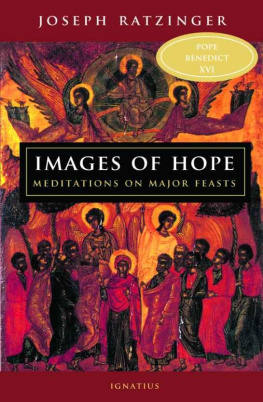Joseph Cardinal Ratzinger - Truth and Tolerance
Here you can read online Joseph Cardinal Ratzinger - Truth and Tolerance full text of the book (entire story) in english for free. Download pdf and epub, get meaning, cover and reviews about this ebook. year: 2009, publisher: Ignatius Press, genre: Religion. Description of the work, (preface) as well as reviews are available. Best literature library LitArk.com created for fans of good reading and offers a wide selection of genres:
Romance novel
Science fiction
Adventure
Detective
Science
History
Home and family
Prose
Art
Politics
Computer
Non-fiction
Religion
Business
Children
Humor
Choose a favorite category and find really read worthwhile books. Enjoy immersion in the world of imagination, feel the emotions of the characters or learn something new for yourself, make an fascinating discovery.
- Book:Truth and Tolerance
- Author:
- Publisher:Ignatius Press
- Genre:
- Year:2009
- Rating:4 / 5
- Favourites:Add to favourites
- Your mark:
- 80
- 1
- 2
- 3
- 4
- 5
Truth and Tolerance: summary, description and annotation
We offer to read an annotation, description, summary or preface (depends on what the author of the book "Truth and Tolerance" wrote himself). If you haven't found the necessary information about the book — write in the comments, we will try to find it.
Joseph Cardinal Ratzinger: author's other books
Who wrote Truth and Tolerance? Find out the surname, the name of the author of the book and a list of all author's works by series.
Truth and Tolerance — read online for free the complete book (whole text) full work
Below is the text of the book, divided by pages. System saving the place of the last page read, allows you to conveniently read the book "Truth and Tolerance" online for free, without having to search again every time where you left off. Put a bookmark, and you can go to the page where you finished reading at any time.
Font size:
Interval:
Bookmark:
TRUTH AND TOLERANCE
JOSEPH CARDINAL RATZINGER
AND
TOLERANCE
Christian Belief and World Religions
Translated by Henry Taylor
IGNATIUS PRESS SAN FRANCISCO
Original German title:
GlaubeWahrheitToleranz: Das Christentum und die Weltreligionen
2003 Verlag Herder, Freiburg im Breisgau
Third printing 2004
Original Italian title:
Fede Verita Tolleranza: Il cristianesimo e le religioni del mondo
2003 Edizioni Cantagalli, Siena, Italy
Cover design by Roxanne Mei Lum
Central cover image: Altar cross (Christ on the Cross). Mosan. Late 12th c.
Victoria and Albert Museum, London, Great Britain
Victoria & Albert Museum, London / Art Resource, New York
2004 by Ignatius Press, San Francisco
All rights reserved
ISBN 978-1-58617-035-6 (PB)
ISBN 978-1-68149-606-1 (EB)
Library of Congress Control Number 2004103529
Printed in the United States of America
Dedicated to
Professor Horst Brkle
in friendship and affection
PART ONE
The Christian Faith in Its Encounter with Cultures and Religions
1. Inclusivism and Pluralism
2. Is Christianity a European Religion ?
3. Hellenization ?
4. Abraham and Melchizedek
5. Distinguishing What Is Christian
6. Multireligious and Interreligious Prayer
PART TWO
Religions and the Question of Truth
1. Faith between Reason and Feeling
2. ChristianityThe True Religion?
3. Faith, Truth, and Culture Reflections Prompted by the Encyclical Fides et Ratio
1. FaithTruthTolerance
2. Freedom and Truth
In a world that is drawing ever closer together, the question about the meeting of religions and cultures has become a most important subject, and one that is certainly not just the business of theology. The question of the peaceableness of cultures, of peace in matters of religion, has also moved up to become a political theme of the first rank. Yet it is nonetheless first of all a question directed to the religions themselves, how they relate to one another peacefully and how they can contribute to the education of the human race in the direction of peace. This complex of problems applies especially to the Christian faith, in that from its very origin, and in its essential nature, it claims to know and to proclaim the one true God and the one Savior of all mankind: There is salvation in no one else, for there is no other name under heaven given among men by which we must be saved, said Peter to the rulers and the elders of the people of Israel (Acts 4:12). Can this absolute claim still be maintained today? How does it relate to the search for peace among religions and cultures? When the Congregation for the Doctrine of the Faith published the declaration Dominus Iesus, On the Unicity and Salvific Universality of Jesus Christ and the Church , in 2000, a cry of outrage arose from modern society, but also from great non-Christian cultures such as that of India: this was said to be a document of intolerance and of a religious arrogance that should have no more place in the world of today. The Catholic Christian could only, in all humility, put the question that Martin Buber once formulated to an atheist: But what if it is true? Thus it becomes apparent that, beyond all particular questions, the real problem lies in the question about truth. Can truth be recognized? Or, is the question about truth simply inappropriate in the realm of religion and belief? But what meaning does belief then have, what positive meaning does religion have, if it cannot be connected with truth?
Thus, various levels of argument have emerged in the dispute, into the midst of which I have in the past decade been drawn for a variety of reasons. We have first to try to understand what culture is and how cultures may relate to one another. In the same way we have to get a view of the phenomenon of religion as such and cannot simply start from an undifferentiated mass of religions in general. We first have to try to understand them as they are, in their historical dynamic, in their essential structures and types, as also in their possible relations with one another or as possible threats to each other, before we try to arrive at any judgments. In the end, the question of man is up for discussion here, what he is and how he can become himself or can squander the opportunity to do so. And finally, we have inevitably to face up to the question of whether man is made for the truth and in what way he can, and even must, put the question of truth.
All of this describes a large program, toward which a small book, which has grown rather by chance, can certainly make only a modest contribution. As I looked through my lectures on this subject area from the past decade, it emerged that these approaches from various starting points had nevertheless amounted to something like a single wholequite fragmentary and unfinished, of course, but, as a contribution to a major theme that affects us all, perhaps not entirely unhelpful. I have therefore decided to present as a whole in this book those texts whose themes are directed to questions concerning faith, religion, culture, truth, and tolerance and thatwith the exception of the first piece, published as early as 1964were all written in the past decade and to put them up for discussion. I hope that a book that has thus been put together, with all its insufficiencies, may yet be of help in the struggle for what concerns us all.
Joseph Cardinal Ratzinger
Rome
Feast of the Transfiguration of Christ
2002
THE CHRISTIAN FAITH IN ITS ENCOUNTER
WITH CULTURES AND RELIGIONS
THE UNITY AND DIVERSITY OF RELIGIONS:
THE PLACE OF CHRISTIANITY
IN THE HISTORY OF RELIGIONS
Preliminary Remarks
I wrote this piece in 1963, for the Festschrift published in 1964 on the occasion of Karl Rahners sixtieth birthday; From 1955 to 1963, in the context of my lectures on fundamental theology at Freising and at Bonn, I had also taught about the philosophy of religion and the history of religions and had thereby discovered the importance of the subject of world religions. When this piece appeared in 1964, the Council was at its height; the great debates about the Church, about revelation, about Church and world, dominated theological literature. The subject of world religions was still somewhat marginal; in the work of the Council, it just happened to find a place in the decree Nostra aetate of October 28, 1965, and to judge from the space allotted, it was not a central theme. Originally, if I recall things correctly, only a declaration on the relation between the Church and the Jews had been planned, which was seen as necessary because of the dramatic events during the Nazis time in power. A rethinking of the relationship between Christians and the Jewish people had to be one of the themes of the Council. Eastern Christians, who could not regard the historical experience of the West as their own, held that such a declaration could only be made if at the same time something was said about Islam. After this broadening of the theme, it was an almost self-evident development to try to say something about the world of non-Christian religions as a whole. A decree that took shape more or less by chance proved later to be particularly forward-looking.
It seemed appropriate to honor Karl Rahner on his birthday with a paper on this theme, which was just beginning to come to the notice of theologians, inasmuch as this great theologian had included in the fifth volume of his collected works (1962) an essay on Christianity and the Non-Christian Religions, which had been published in 1961 and in which he pointed out that, in a situation in which each and every people and culture is becoming an element of inner motivation to every other people and every other culture, every religion that exists in the world has become something that raises questions and opens up possibilities for every other person in the world. This paper, in which Rahner developed the concept of the anonymous Christian as a keyword in his response to the challenge of other religions, later became the starting point for arguments that were at times heated. Toward the end of his article, he summed up what he meant by this concept: It may appear presumptuous to non-Christians for the Christian to reckon the healthy element, that which has been healed and made holy, in every man as a fruit of the grace of Christ and as anonymously Christian and for him to regard the non-Christian as a Christian who has not yet become consciously aware of himself. But the Christian cannot renounce this presumption (p. 158).
Next pageFont size:
Interval:
Bookmark:
Similar books «Truth and Tolerance»
Look at similar books to Truth and Tolerance. We have selected literature similar in name and meaning in the hope of providing readers with more options to find new, interesting, not yet read works.
Discussion, reviews of the book Truth and Tolerance and just readers' own opinions. Leave your comments, write what you think about the work, its meaning or the main characters. Specify what exactly you liked and what you didn't like, and why you think so.

